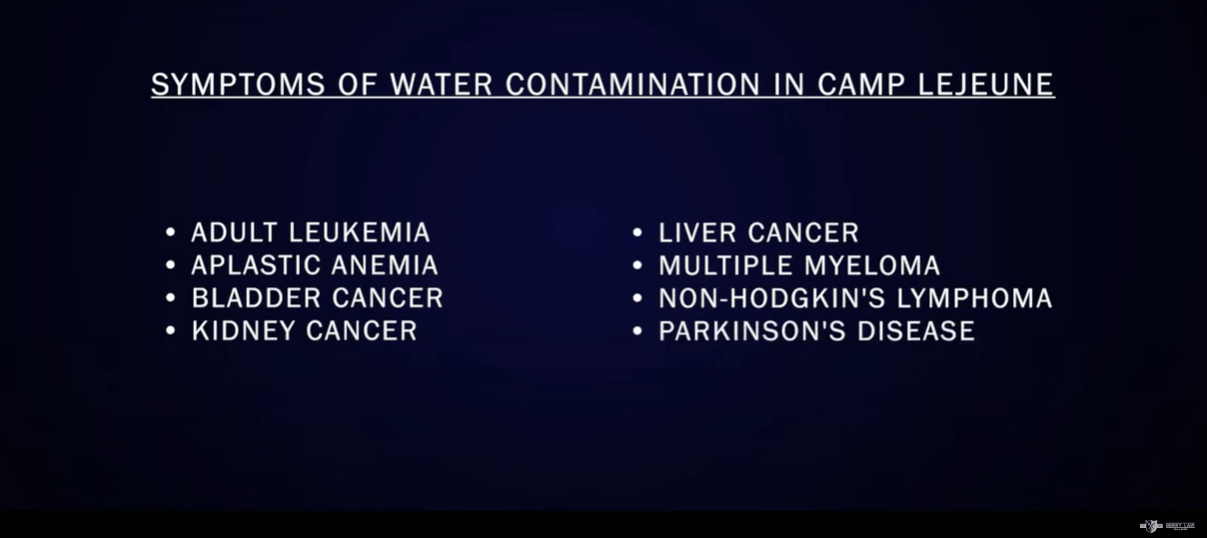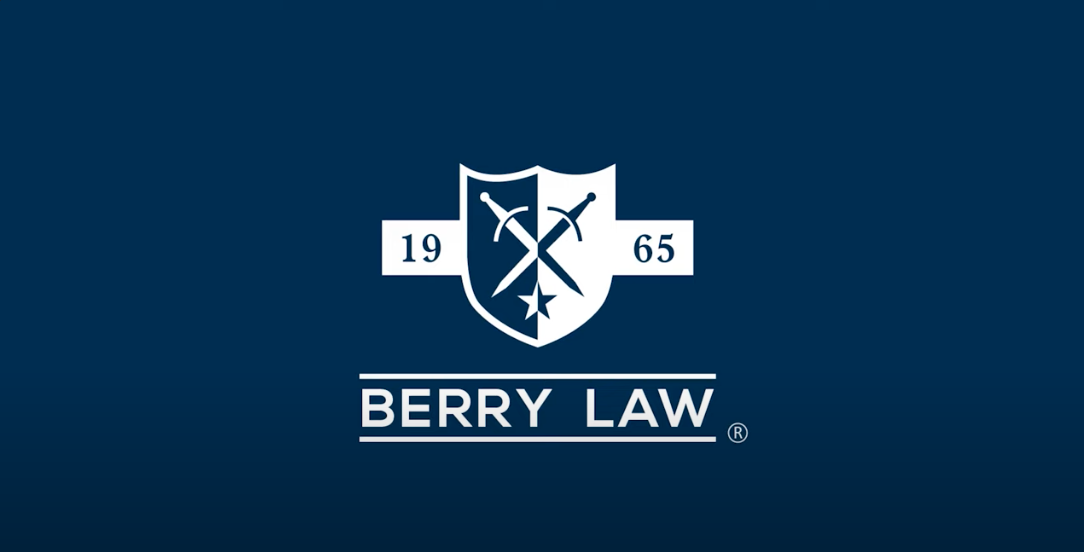Camp Lejeune Water Contamination
Near the Marine Corps Base Camp Lejeune along the North Carolina coastline, toxic chemicals, including trichloroethylene and benzene, seeped into the soil at fuel depots, base junkyards, and businesses.
The chemicals poisoned groundwater with hazardous volatile organic compounds for over three decades, beginning in 1953, and contaminated the drinking water on the base. Millions of Marines and their family members were exposed to these dangerous chemicals in the water they drank, cooked in, and bathed in. Many of them developed diseases and disabilities, including cancers, Parkinson’s Disease, and neurological conditions.
The government provides health care and health care funding assistance to Veterans and their family members who lived on Camp Lejeune or Marine Corps Air Station (MACS) New River, North Carolina, meet the time-on-station and service date requirements, and have one of the covered conditions. under the Camp Lejeune Act of 2012.
As of August 10, 2022, with the passing of the Camp Lejeune Justice Act, Veterans, their families, and civilians exposed to contaminated water at Camp Lejeune (including children who were exposed in utero) who became ill, can now seek additional compensation for medical bills, pain and suffering, lost wages, and more through a civil lawsuit in federal court.
However, there is a strict two-year deadline for filing these claims. If you or a loved one suffered from certain diseases or disabilities after exposure to contaminated water at Camp Lejeune, talk with a knowledgeable Camp Lejeune water contamination attorney to learn what compensation you may be entitled to.
The Camp Lejeune Justice Act of 2022
For years, those exposed to contaminated water at Camp Lejeune struggled to recover compensation for the injuries they suffered due to years of contaminated water exposure. In August 2022, the U.S. government finally cleared the way for service members and their families to file administrative claims for compensation.
On August 10, 2022, President Biden signed The Camp Lejeune Water Contamination Justice Act as part of the broader Honoring Our PACT Act legislation. The law allows those exposed to water contamination at the military base to file civil lawsuits in federal court within two years of signing the act into law to obtain compensation for their injuries separate from Veteran’s Administration health and disability benefits.
The law aims to do what the Camp Lejeune Families Act of 2012 failed to do for many of those exposed to contaminated drinking water. It allows them to file a legal claim against the government to claim damages for illnesses caused by toxic exposure.
Without this bill, military service members, their families, and civilians sickened by the contaminated water at Camp Lejeune would not be able to recover compensation for their injuries due to North Carolina law that places a strict 10-year time frame on individuals to file suit. The Camp Lejeune Justice Act removes this statute of repose so that Camp Lejeune water contamination claims can be heard on their merits.
Who Qualifies for Compensation Under the Camp Lejeune Justice Act?
- The individual, including (but not limited to) Veterans, must have resided, worked, or was otherwise exposed to water at Camp Lejeune between August 1, 1953 and December 31, 1987 for at least 30 days. This includes children who were exposed in utero.
- The individual must produce evidence showing a relationship between exposure to the water at Camp Lejeune and the harm the individual experienced.
- All injury and administrative claims must be filed within 2 years of the law’s enactment on August 10, 2022.
To verify your legal options and whether you or your family has a viable claim, it may be a good idea to consult with a knowledgeable Camp Lejeune water contamination attorney.
A History of Toxic Exposure at Camp Lejeune
The U.S. government established the Camp Lejeune military training facility in 1942. Through the years, it became one of the Corps’ busiest and largest bases. Millions of service members and their families called the base home.
In 1982, testing revealed that industrial solvents trichloroethylene (TCE) and perchloroethylene (PCE) had contaminated two water treatment facilities at the base at levels that reached nearly 400 times beyond what safety standards allowed. Later testing found the same systems contaminated with the known carcinogen benzene and other toxic chemicals.
The water treatment plants supplied water to enlisted-family housing, barracks for unmarried service personnel, base administrative offices, schools, a base hospital, and surrounding recreational areas.
Several sources of contamination were identified, including spills at base industrial sites, storage tank and drum leaks, and improper dumping at an off-base dry cleaner.
It’s known when the water at Camp Lejeune became contaminated. Documents show that the U.S. government knew as early as the 1970s that the water at Camp Lejeune was contaminated. The U.S. government acknowledges that from 1953 to 1987, millions of military service members, their families, and civilian employees at the base were exposed to toxic substances in the drinking water.
The contaminated wells were closed beginning in 1984 and all shuttered by 1987. The move came only after heavy pressure from Veterans, families, and Veterans advocacy groups. In 1989, the Environmental Protection Agency (EPA) listed the base as a Superfund site.
VA Disability Benefits for Camp Lejeune Water Contamination Illnesses
Veterans affected by Camp Lejeune water contamination also have the option to file VA disability benefits claims and receive up to $3,000 in monthly payments, depending on the VA’s determination of the claimant’s disability rating.
In January 2017, the VA published a new rule that made it easier for Veterans to obtain these benefits if they suffer from one of eight diseases associated with contaminated water.
Normally, to obtain VA disability compensation, a Veteran must show three things: (1) a current disability, (2) an in-service injury or illness, and (3) a link between the in-service injury or illness and the current disability.
Under the VA presumptive rules for contaminated water at Camp Lejeune, under some circumstances, VA will presume an in-service injury (exposure to contaminated water) or a link between a disability and in-service contaminated water exposure—or both—for certain Veterans. This makes it much easier to prove a connection to service and gain VA disability compensation benefits.
For exposure to be presumed, the Veteran must have certain service experience. For a medical link to be presumed, the Veteran must have exposure to contaminated water, and one of the disabilities that the VA has determined is highly linked to exposure to contaminated water.
Even if a Veteran does not qualify for the presumptions of in-service exposure to contaminated water or a link between a current disability and service, the Veteran can still obtain VA disability benefits—but his or her claim must show more evidence of a connection to service.
In addition, separate from disability compensation, Veterans and their family members who lived at Camp Lejeune during the contamination period can receive certain VA health care benefits if they suffer from one of these 15 illnesses linked to the base’s contaminated water:
- Esophageal cancer
- Breast cancer
- Kidney cancer
- Multiple myeloma
- Renal toxicity
- Female infertility
- Scleroderma
- Non-Hodgkin’s lymphoma
- Lung cancer
- Bladder cancer
- Leukemia
- Myelodysplastic syndromes
- Hepatic steatosis
- Miscarriage
- Neurobehavior effects
How Berry Law’s Camp Lejeune Water Contamination Attorney can help
Berry Law helps qualifying Veterans and their family members file injury and death administrative claims under the Camp Lejeune Justice Act, including surviving family members who lost a loved one years ago due to this exposure. The firm’s lawyers also help Veterans appeal or reopen existing disability claims and seek other benefits related to Camp Lejeune water contamination.
We work with Veterans and their families nationwide. The deadline is quickly approaching! Contact us today to discuss your case before the August 10, 2024 deadline.




